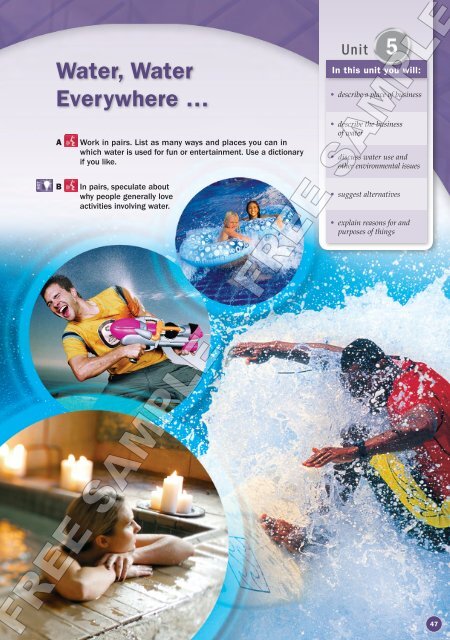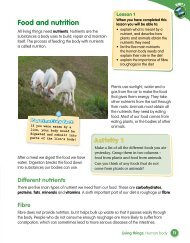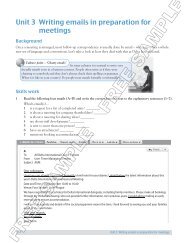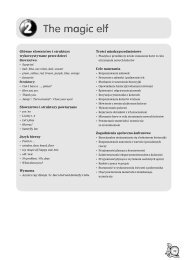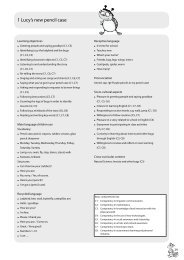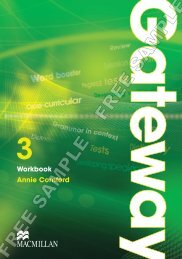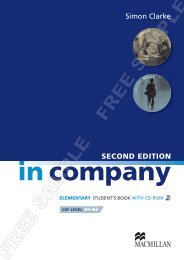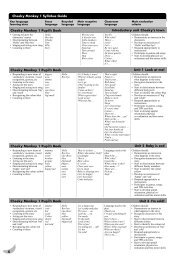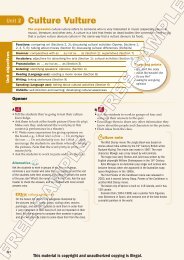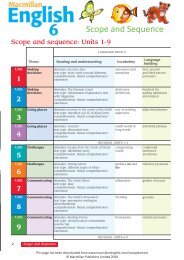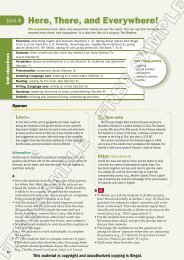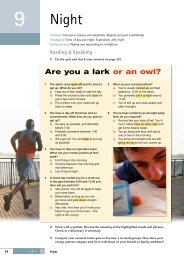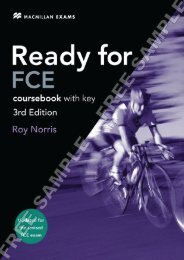Create successful ePaper yourself
Turn your PDF publications into a flip-book with our unique Google optimized e-Paper software.
Water, WaterEverywhere …ABWork in pairs. List as many ways and places you can inwhich water is used for fun or entertainment. Use a dictionaryif you like.In pairs, speculate aboutwhy peop<strong>le</strong> generally loveactivities involving water.UnitIn this unit you will:• describe a place of business• describe the businessof water• discuss water use andother environmental issues• suggest alternatives• explain reasons for andpurposes of thingsFREE SAMPLE FREE SAMPLE47
1 Grammar: the passiveReading: inferring248A Language in context Read this description of a restaurant.Would you enjoy eating there? Why or why not?Would you enjoy having dinner surrounded by crystal-c<strong>le</strong>ar water whi<strong>le</strong> you watch exotic fishswim by your tab<strong>le</strong>? Then you might be interested in the world’s first underwater restaurant “Ithaa”in the Maldives. The restaurant was built as part of a luxury resort and offers guests one of theworld’s most unusual dining experiences. It was opened in April 2005; four months after muchof the area had been destroyed by the December 26th tsunami. The who<strong>le</strong> restaurant had beenconstructed in Singapore before it was transported to the Indian Ocean. A mix of Western andAsian food is served, and be ready to be surprised because the menu is currently being updated.Naturally, a lot of the food on the menu has been taken straight out of the water!13 | JUNE 30B Notice Look back at the artic<strong>le</strong> and comp<strong>le</strong>te the tab<strong>le</strong> with the correct passive form for each tense.C Practice Comp<strong>le</strong>te the sentences with the correct form of the passiveand the verb in parentheses.1 Ithaa (design) by a company in New Zealand in 2004.2 Diners (serve) theme cocktails when they arrive.3 The restaurant (give) a number of awards since it opened.4 Experts say that up to now, ocean life (not affect) by the restaurant.5 After the restaurant (build) in Singapore, it was transported to its present location.6 The windows (c<strong>le</strong>an) every six weeks to allow guests a c<strong>le</strong>ar view of the fishand sharks.7 Most of the resorts near Ithaa (rebuild) since the tsunami in 2004.8 A comp<strong>le</strong>te underwater hotel (construct) right now in the Midd<strong>le</strong> East.DTense Form Examp<strong>le</strong>Simp<strong>le</strong> present passive am/is/are + past particip<strong>le</strong> … Asian food is served …Simp<strong>le</strong> past passive was/were + past particip<strong>le</strong> The restaurant was built …Present progressive passive (1) … the menu is being updated.Present perfect passive (2)Now you do it Work in pairs. Read theinformation below about the world’s largestswimming pool. Take turns telling your partnersomething about it using the passive.Built in: Algarrobo, Chi<strong>le</strong>Open since: December 2007Fil<strong>le</strong>d with: seawaterNamed: world’s largest swimming poolby Guinness Book of World RecordsAttracted: thousands of visitors per monthsince it opened… the food on the menu has beentaken straight out of the water!Past perfect passive (3) … the area had been destroyed …San Alfonso del Mar ResortWatch out!The aquarium wasopened by the mayor.The aquarium was opening by the mayor.“Inferring” means looking for the meaning behind what we hear, read, or see. By thinking carefully about whatyou're told in a piece of writing, you can “read between the lines.”A Read this text about bott<strong>le</strong>d water. Do you think the writer has a positive or negative opinion ofBling H 2O? Why?B Read the text again and answer the questions.1 Which phrase in the text tells us that the writer is surprised that one liter of Bling H 2O can sell for $40?a) that’s not a mistake b) it’s not flavored2 What does the underlined sentence tell us about the writer’s opinion?a) He is likely to buy Bling H 2O. b) He is unlikely to buy Bling H 2O.3 Who do you think might have written the text?a) the head of a city water company b) someone whose job is selling bott<strong>le</strong>d waterC Vocabulary: the business of water. Comp<strong>le</strong>te the statementswith the correct form of these words and phrases <strong>fr</strong>om the text.refill retail price charge shipping profit source tap water deliverThe average (1)can (2)Designer WaterOK, so selling water is not a new idea, and there are lots of ways peop<strong>le</strong> can make money <strong>fr</strong>om this precious natural resource,but last week I was told about a company, Bling H 2O, that’s selling one liter of water for $40.00. No, that’s not a mistake—it’s notflavored, and I am not making this up. A case of twelve 750 ml bott<strong>le</strong>s sells for $419.40, and the “Baby Bling” case of twenty-four375 ml bott<strong>le</strong>s has a retail price of $480. If you’re really looking for value, they sell a case of twenty-four 16.9 oz plastic bott<strong>le</strong>sfor $24. Unbelievab<strong>le</strong>, eh?Just for fun, I thought I’d compare how many times a one liter water bott<strong>le</strong> could be refil<strong>le</strong>d using tap water for the same $40.00.The city water company charges $1.86 for 748 gallons. For $40.00, you get 16,082 gallons of some of the finest water there is.And shipping is included! Right to your faucet, 24/7, water is delivered for all your household, commercial, and industrial needs,all for four gallons per penny. And any profits made by the city go right back into improving water quality.According to the World Health Organization, one person in six—more than one billion of our fellow human beings—has litt<strong>le</strong>choice but to use potentially harmful sources of water. When you consider that some peop<strong>le</strong> are prepared to pay $40.00 per literfor “designer” water, it really makes you wonder about peop<strong>le</strong> having money to burn.Adapted <strong>fr</strong>om www.portlandonline.comfor bott<strong>le</strong>d water in stores is way too high. The amount storesfor it should be regulated.It’s silly for peop<strong>le</strong> to buy bott<strong>le</strong>d water if they have c<strong>le</strong>an (3)no need to pay for containers and (4) !Bott<strong>le</strong>d water companies should be required to give part of their (5)city areas that don’t have a natural (6)It’s possib<strong>le</strong> that some companies just (7)(8) it to stores to be sold for high prices.of c<strong>le</strong>an water.; then there’sto innertheir bott<strong>le</strong>s with tap water andD Work in groups. Discuss whether you agree or disagree with the statements in Exercise C.FREE SAMPLE FREE SAMPLEUnit 549
3450Language use: contributing to an online debateA Read this subject for an online debate. What’s your opinion on the issue?B Now read these contributions to the debate. Circ<strong>le</strong> whether each writer agrees or disagreesthat water companies should limit the amount of water peop<strong>le</strong> use.CWrite your own paragraph to contribute to the debate. Mention at <strong>le</strong>ast one more argument tosupport your opinion on the issue. Then compare your ideas in small groups.Pronunciation: /r/AWelcome to News 24/7 online. The online news service.This week, in response to last week’s news item about water poverty, we’re asking you to contribute your thoughts to the following debate:“Water companies should limit the amount of water we can use in our homes.” Monday 27 March 17:40 GMTa) agreesb) disagreesa) agreesb) disagreesa) agreesb) disagreesListen to these words. Notice the pronunciation of the sound /r/ is the samealthough it is spel<strong>le</strong>d in different ways. Practice saying the words in pairs.r: resource, refill, meter, water, deliver, Thursdayrr: carry, currently, arrive, surroundedwr: write, wrink<strong>le</strong>, wrist, wrongrh: rhythm, rhino, rhymeAugust 28, 12:34posted by: adrianI’m amazed that the system we have hasn’t been adopted everywhere. Here in Chi<strong>le</strong>, about96% of peop<strong>le</strong> have metered water. That means every house has a water meter and we pay forwhat is used. It makes peop<strong>le</strong> more careful about not wasting water and it works. Otherwise a lotof peop<strong>le</strong> would use water without even thinking about it.August 29, 0:11posted by: bebe12I agree with Adrian that having water meters is a good idea. But that’s not really the issue. Myfeeling is that the government, in cooperation with environmental groups, should decide howmuch water we can use—not water companies. They’re only interested in charging as much asthey can for water and maximizing their profits. And if they limit our water usage, it’s not like thatwater is being delivered to peop<strong>le</strong> who really need it, is it?September 2, 18:42posted by: yodaI don’t think it’s a perfect solution to the prob<strong>le</strong>m of water poverty, but it is a step in the rightdirection. Putting limits on water consumption is a good idea. It might encourage peop<strong>le</strong> to makeuse of alternative sources of water much more, too. Our water is metered, so we use rain water asmuch as possib<strong>le</strong> and it saves us a lot of money!B Now say these sentences. Listen to how you say the /r/ sound. Then listen and check.On Thursday, Rick delivered three red water meters.Randy arrived with a broken wrist!I’m writing a rhyme about the rhythm of rain on the roof.Grammar: expressions of purposeA Language in context Read these FAQs about water. Do any facts surprise you?Q: How long can humans survive without water?A: Well, not for very long! Because we need water to control all of our body’sfunctions, scientists estimate we can survive for only about three or four days.Q: How much water does the average person use per day?A: The average U.S. citizen uses between 80 and 100 gallons of water daily.Not surprisingly, most of that water is used for washing and flushing the toi<strong>le</strong>t!Q: Is it dangerous to drink too much water?A: Yes, very! Obviously, in order to be healthy we should drink p<strong>le</strong>nty of water,but drinking too much can cause death. So as not to suffer the effects of“water intoxication,” don’t drink more than about 30 cups of water a day.Q: Are there any animals that don’t need to drink water?A: Yes, a few. The kangaroo rat, for examp<strong>le</strong>. So that it can survivein the desert, it gets all the water it needs <strong>fr</strong>om the plants it eats.B Notice Comp<strong>le</strong>te each blank below with an examp<strong>le</strong> <strong>fr</strong>om the text in Exercise A.We use expressions of purpose to say why a person or thing does something.Expression of purpose Use Examp<strong>le</strong>for + gerundto + base formused to show the purposeof a thing or materialused to say why a person oranimal uses or does somethingso (that) + (pro)noun + clause used to talk about purpose (3)in order (not) to/so as (not) to + base formused to talk about purpose(more formal)C Practice Comp<strong>le</strong>te the sentences with an appropriate expression of purpose and the verb inparentheses. There may be more than one correct answer in some sentences.Watch out!1 We did an experiment in class (understand) how wateris used by plants.I went swimming to relax.2 They add a special chemical to the water in the pool (keep) it c<strong>le</strong>an.I went swimming for relax.3 (avoid) getting sick in foreign countries, drink only bott<strong>le</strong>d water.4 Water therapy is great (help) stressed-out peop<strong>le</strong> to relax.5 Feed houseplants regularly with water (they / will not die).6 Some companies claim bott<strong>le</strong>d water has health benefits (charge) a higher retail price.7 I use tap water (refill) my reusab<strong>le</strong> water bott<strong>le</strong> when I go to the gym.8 Try using <strong>le</strong>ss water (wash) and (cook). It makes a difference!D Now you do it Work in pairs. Discuss these questions. Use expressions of purpose.1 How much water do you drink a day? Why?2 Do you prefer drinking bott<strong>le</strong>d water or tap water? Why?3 How many different uses for water can you think of?FREE SAMPLE FREE SAMPLE(1)(2)(4)(5)5Unit 551
masterSkillsCritical thinking:developing empathyABWork in pairs. Make a list of all the different waysyou use water during a day. Then try to estimatehow much water you use per day in liters. Thefollowing information might help. Compare yourwater usage with your classmates.for taking a shower = approx. 25 liters per minutefor having a bath = approx. 150 litersfor brushing teeth = six liters per minutefor flushing the toi<strong>le</strong>t = approx. six litersfor washing clothes = 50 liters per loadfor cooking and drinking = approx. five liters per dayIn groups, discuss what kinds of water prob<strong>le</strong>msyou’ve experienced. Say how you felt.Empathy is the ability tounderstand how someonefeels because you can imaginewhat it’s like to be them.When you empathize withsomeone, it makes it easierfor you to communicate withthem, even if their experienceof something is very different<strong>fr</strong>om yours.How to say itLast spring/summer, etc. we hada drought/flood and …Our drinking water isn’t veryc<strong>le</strong>an, so we have to …It’s not easy being without waterbecause …When the water gets cut off, itmeans (that) …CDERead this information aboutShartati and her family. Workin pairs to estimate how muchwater you think she and herfamily use per day.Listen to Shartati talking about her daily routine.How accurate were your guesses about herfamily’s water usage?Work in groups. Discuss the questions below.1 Think about the water prob<strong>le</strong>ms youdiscussed in Exercise B. How do yourprob<strong>le</strong>ms compare with Shartati’sprob<strong>le</strong>m in seriousness?2 Look back at the water usage you calculatedin Exercise A. What things would you needto give up to bring your water usage inline with Shartati’s?3 With your answers to 1 and 2 in mind,now take a minute to imagine yourselfin her situation. How would you feel?4 How might the world be different ifpeop<strong>le</strong> took more time to put themselvesin other peop<strong>le</strong>’s shoes?Ref<strong>le</strong>ct …Do you find it easy toempathize with peop<strong>le</strong>you don’t know? Why orwhy not?FREE SAMPLE FREE SAMPLEThis is Shartati and one of herdaughters. She has five childrenranging in age <strong>fr</strong>om six months tonine years old. They live in a villagein the north of Ethiopia. Shartati’shusband is a farmer.54 55Unit 5
2Language Wrap-up1 Vocabulary56A Comp<strong>le</strong>te the ad with appropriate words. You have been given the first <strong>le</strong>tter. (5 points)8–10 correct:I can use wordsto describe thebusiness of water andenvironmental issues.0–7 correct:Look again atSections 2 and 6 onpages 49 and 52.Score: /10B Circ<strong>le</strong> the correct answers to comp<strong>le</strong>te the text. (5 points)After the tsunami in Indonesia in 2004, many villages in coastal areas were washed away by the (1) floods /drought. But the disaster had other consequences: (2) water poverty / diseases spread rapidly because of the numberof peop<strong>le</strong> who had died. It was also difficult to find c<strong>le</strong>an (3) sources / resources of drinking water because of(4) climate change / water pollution. Volunteer doctors strugg<strong>le</strong>d with poor <strong>le</strong>vels of (5) famine / hygiene because of alack of medical supplies. However, many areas have now recovered thanks to worldwide help.GrammarAt Water 2U we aim to (1) dbott<strong>le</strong>d water to your door, when youneed it. Below are a few reasons why our customers come back for more:• You won’t find lower (2) pA Rewrite what these peop<strong>le</strong> have said in the passive voice. (5 points)8–10 correct:I can use the passivevoice and expressionsof purpose.0–7 correct:Look again atSections 1 and 5 onpages 48 and 51.Score: /10• We don’t (3) cLatin America.• All bott<strong>le</strong>s returned to us are (4) r• Our (5) s1 “Climate change has seriously affected the environment.”“The environment .”2 “The water company cut off our water supply last week.”“Our water supply .”3 “Before we bought the house, a flood damaged the basement.”“Before we bought the house, the basement .”4 “They’re charging me $10 for this bott<strong>le</strong>d water!”“I .”5 “They limit water usage in some areas.”“Water usage .”B Comp<strong>le</strong>te each sentence with a suitab<strong>le</strong> expression of purpose. (5 points)1 I use tap water cooking, but not drinking.2 So avoid wasting water, turn off the faucet when you brush your teeth.3 Take an umbrella you don’t get wet!4 not to have hygiene prob<strong>le</strong>ms, shower regularly.5 We use rain water c<strong>le</strong>an the deck.anywhere else!for delivery within the U.S. andat the source, saving on waste.costs to the rest of the world are highly competitive.Call us with your order today at (1-800) 235-2667.FREE SAMPLE FREE SAMPLE


